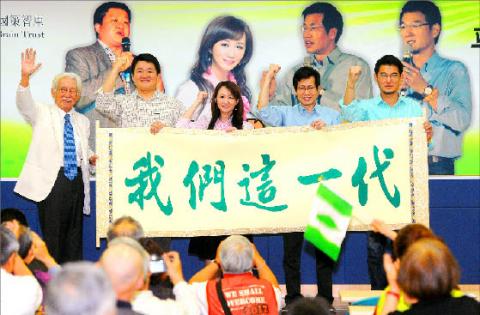Pro-independence heavyweight Koo Kwang-ming (辜寬敏) yesterday announced he is launching the “Our Generation Alliance,” a new political action group made up of Democratic Progressive Party (DPP) legislative candidates.
The group provides an alternative to the growing “One Side, One Country Alliance” set up by former president Chen Shui-bian (陳水扁) last year.
Four legislative candidates have already announced their addition to the ranks of Our Generation Alliance, mostly nominees facing races in tough-to-win electoral districts including Ho Po-wen (何博文) and Lo Chih-cheng (羅致政).

Photo: Wang Min-wei, Taipei Times
Ho is running against KMT Legislator Wu Yu-sheng (吳育昇), while Lo, a political science professor, is running in New Taipei City’s (新北市) Banciao (板橋) constituency. Lo is also a member of the One Side, One Country Alliance.
DPP Taipei City Councilor Chien Yu-yen (簡余晏), another member, is also seeking the DPP’s nomination to run in Taipei City’s Zhongshan-Songshan (中山-松山) electoral district, where she will face Chinese Nationalist Party (KMT) Legislator Lo Shu-lei (羅淑蕾).
The fourth member, DPP Legislator Liu Chien-kuo (劉建國), is vying for re-election in Yunlin County’s Siluo-Douliu (西螺-斗六) electoral district after he won a by-election in 2009.
“I personally guarantee that these [four candidates] represent [Taiwan’s] hopes,” said Koo, a former senior presidential advisor who also heads the Taiwan Brain Trust. “The think tank endorses all four of these people.”
Koo added he expected more candidates to also join the platform for “societal fairness, generational fairness, transitional fairness and international fairness.”
The so-called alliances are a growing force in the DPP, which has gradually seen the influence of its factions decline in the past few years. Alliance members generally stump for each other in political events and pool some resources together.
It is part of a trend toward having cadres of lawmakers connected to more heavyweight politicians. Former premiers Su Tseng-chang (蘇貞昌) and Frank Hsieh (謝長廷) each have influence over a group of city councilors and lawmakers.

A magnitude 4.9 earthquake struck off Tainan at 11:47am today, the Central Weather Administration (CWA) said. The hypocenter was 32.3km northeast of Tainan City Hall at a depth of 7.3km, CWA data showed. The intensity of the quake, which gauges the actual effect of a seismic event, measured 4 in Tainan and Chiayi County on Taiwan's seven-tier intensity scale, the data showed. The quake had an intensity of 3 in Chiayi City and County, and Yunlin County, while it was measured as 2 in Kaohsiung, Nantou County, Changhua County, Taitung County and offshore Penghu County, the data showed. There were no immediate reports of

Weather conditions across Taiwan are expected to remain stable today, but cloudy to rainy skies are expected from tomorrow onward due to increasing moisture in the atmosphere, according to the Central Weather Administration (CWA). Daytime highs today are expected to hit 25-27°C in western Taiwan and 22-24°C in the eastern counties of Yilan, Hualien, and Taitung, data on the CWA website indicated. After sunset, temperatures could drop to 16-17°C in most parts of Taiwan. For tomorrow, precipitation is likely in northern Taiwan as a cloud system moves in from China. Daytime temperatures are expected to hover around 25°C, the CWA said. Starting Monday, areas

The Chinese Nationalist Party (KMT) is maintaining close ties with Beijing, the Democratic Progressive Party (DPP) said yesterday, hours after a new round of Chinese military drills in the Taiwan Strait began. Political parties in a democracy have a responsibility to be loyal to the nation and defend its sovereignty, DPP spokesman Justin Wu (吳崢) told a news conference in Taipei. His comments came hours after Beijing announced via Chinese state media that the Chinese People’s Liberation Army’s Eastern Theater Command was holding large-scale drills simulating a multi-pronged attack on Taiwan. Contrary to the KMT’s claims that it is staunchly anti-communist, KMT Deputy

Taiwan has recorded its first fatal case of Coxsackie B5 enterovirus in 10 years after a one-year-old boy from southern Taiwan died from complications early last month, the Centers for Disease Control (CDC) said yesterday. CDC spokesman Lo Yi-chun (羅一鈞) told a news conference that the child initially developed a fever and respiratory symptoms before experiencing seizures and loss of consciousness. The boy was diagnosed with acute encephalitis and admitted to intensive care, but his condition deteriorated rapidly, and he passed away on the sixth day of illness, Lo said. This also marks Taiwan’s third enterovirus-related death this year and the first severe